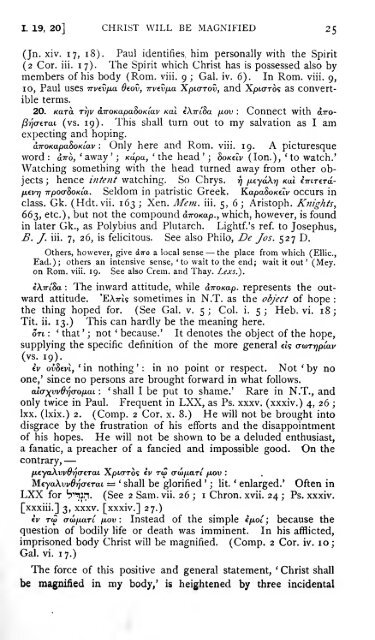Philippians and Philemon - MR Vincent - 1906.pdf
Philippians and Philemon - MR Vincent - 1906.pdf
Philippians and Philemon - MR Vincent - 1906.pdf
You also want an ePaper? Increase the reach of your titles
YUMPU automatically turns print PDFs into web optimized ePapers that Google loves.
I. 19, 20] CHRIST WILL BE MAGNIFIED 2$<br />
(Jn. xiv. 17, 18). Paul identifies, him personally with the Spirit<br />
(2 Cor. iii. 17). The Spirit which Christ has is possessed also by<br />
members of his body (Rom. viii. 9 ; Gal. iv. 6). In Rom. viii. 9,<br />
10, Paul uses^,, ,<strong>and</strong> as conveit-<br />
'ible terms.<br />
20. «' : Connect with -<br />
(vs. 19)• This shall turn out to my salvation as I am<br />
expecting <strong>and</strong> hoping.<br />
: Only here <strong>and</strong> Rom. viii. 19. A picturesque<br />
' word : , away ' '<br />
; , the head '<br />
; (Ion.), * . € -<br />
to watch.'<br />
Watching something with the head turned away from other objects<br />
; hence intent watching. So Chrys.<br />
Seldom in patristic Greek. occurs in<br />
class, Gk. (Hdt. vii. 163 ; Xen. Mem. iii, 5, 6 ; Aristoph. Knights,<br />
663, etc.), but not the compound., which, however, is found<br />
in later Gk., as Polybius <strong>and</strong> Plutarch. Lightf.'s ref. to Josephus,<br />
B. iii.<br />
J. 7, 26, is feUcitous. See also Philo, De Jos. 527 D.<br />
Others, however, give a local sense — the place from which (Ellic,<br />
Ead.); others an intensive sense, 'to wait to the end; wait it out' (Mey.<br />
on Rom. viii. 19. See also Crem. <strong>and</strong> Thay. Lexs.).<br />
: The<br />
inward attitude, while.represents the out-<br />
ward attitude. ?sometimes in N.T. as the object of hope :<br />
the thing hoped for. (See Gal. v. 5; Col. i. 5; Heb. vi. 18;<br />
Tit. ii. 13.) This can hardly be the meaning here.<br />
oTi :<br />
* that ;<br />
' not ' because.' It denotes the object of the hope,<br />
supplying the specific definition of the more general tis<br />
(vs• 19)• ^ .<br />
€v ovSivl, ' in nothing ' : in no point or respect. Not * by no<br />
one,' since no persons are brought forward in what follows.<br />
:<br />
' shall I be put to shame.' Rare in N.T., <strong>and</strong><br />
only twice in Paul. Frequent in LXX, as Ps. xxxv. (xxxiv.) 4, 26 ;<br />
Ixx. (Ixix.) 2. (Comp. 2 Cor. x. 8.) He will not be brought into<br />
disgrace by the frustration of his efforts <strong>and</strong> the disappointment<br />
of<br />
.•<br />
his hopes. He will not be shown to be a deluded enthusiast,<br />
a fanatic, a preacher of a fancied <strong>and</strong> impossible good. On the<br />
contrary, —<br />
« : £•£ = ' shall be glorified ; lit. ' enlarged.' Often in<br />
'<br />
LXX for b^'^in. (See 2 Sam. vii. 26 ; i Chron. xvii. 24 ; Ps. xxxiv.<br />
[xxxiii.] 3, XXXV. [xxxiv.] 27.)<br />
iv : Instead of the simple ; because the<br />
question of bodily life or death was imminent. In his afflicted,<br />
imprisoned body Christ will be magnified. (Comp. 2 Cor. iv. 10<br />
Gal. vi. 17.)<br />
The force of this positive <strong>and</strong> general statement, ' Christ shall<br />
be magnified in my body,' is heightened by three incidental<br />
;





